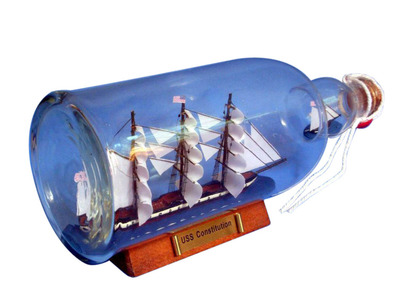
In the previous post, I asked the following question: was US Navy a public good that it was necessary for the US government to provide? After all, it was created to protect American public from the raids by Barbary pirates that hurt US trade that everyone presumably benefited from. And American post-revolutionary merchants were presumably too poor to hire protection themselves.
Three answers to this argument.
1. First answer (source):
Nobody "forced" Americans to begin to build a navy in the 1790s. Government officials and seafaring merchants decided to do so and to deploy this force against (among others) the pirates to whom the government had been paying protection money. They might instead have continued to pay off the Barbary raiders. Or they might have rested content to let the merchants of other nations, perhaps Great Britain, which already had a large navy, handle the shipping of American goods in the Mediterranean. The fact that U.S. leaders resorted to force does not demonstrate that they chose the best option. This option did, however, socialize the costs of engaging in the Mediterranean trade, spreading it across all American taxpayers largely for the sake of the traders who had an immediate interest in the matter.So, there you go. The simple point is: there is no way to tell, at this point, that this was the best thing to do for the "American public". (Whether it was a moral thing to do or not is a separate point.) In order to build a navy, US government taxed other businesses and private citizens. Who can say that North Atlantic trade was more crucial and irreplaceable for the "American public" than the services which did not happen (or happened in lower quantities and qualities) as a result of taxation?
This historical affair might well serve as a lesson applicable to one foreign-policy episode after another in the following sense: the national government's power, created at the national citizenry's expense, was employed to resolve by armed force what amounted to a special-interest economic problem. Stephens's examples of U.S. participation in World War I and the so-called Tanker War conform to the same template. Here is what governments do best: concentrate the benefits and disperse the costs, or, with similar effect, privatize the gains and socialize the losses. National leaders, all too often beholden to one special interest or another, speak as if "we" Americans all have the same interest in knocking down some group of foreigners, but such is rarely the case.
2. It is still not clear to me that it was the case that building ships for defense of merchant fleet was economically impossible until I see specific figures of how much it would cost to build and man a frigate vs. building and manning another merchant ship and that the merchants indeed did not have money to spend on this. I sent a letter to a historian asking about this, and he just reiterated that it would be too expensive without providing actual figures and sources. Then he criticized Fox News. I remain unconvinced.
The reason why American merchants did not raise a private navy could be political: they knew that if they waited and lobbied long enough, American government would take care of the problem (at the taxpayers' expense): either by paying off the pirates or by raising a navy.
3. In response to the question "Why did in nine years of piracy and after eleven trade ships captured by the pirates, did the merchants not raise money for protection?", one can also ask the opposite question: "Why, after nine years of piracy and eleven captured ships, did the American merchants continue sending their ships to the Mediterranean?" Apparently, it was worth it to them, either in actuality or in potential. It's not like the merchants could not go into some other business. So, basically, to make their business more profitable and safer, they convinced US government that their business is a "public good" and therefore, American citizens should be taxed to improve it.
Just like American banks and US auto industry convinced American government that, somehow, American cars are a public good that needs to be protected. Because, G-d forbid we say that, for whatever reason, US auto industry provides inferior product to the American consumer and this product must be handled by Japanese auto industry. No! Americans must drive only American cars. And sell their molasses and raw materials to Great Britain only through American merchants.
I mean, as long as we declare outsourcing evil and protecting "domestic industries" good, maybe the first step should be financing American-born customer service representatives. Everyone knows that when you speak to those Indian representatives, they don't understand what you're saying, and you don't understand what they are saying.
4. Perhaps by allowing British merchants handle the commerce, American merchants could have looked into new venues of profit, thus expanding the trade or economy in general in new areas. This is the classic anti-Luddite argument: yes, machines (computers, Chinese, Indians, robots) take our jobs. But the new capital results in industry expansion and creation of new kinds of jobs. Same way: yes, Walmart drives mom-and-pop stores out of business. But, you could also say that it forces them to start thinking about what kind of unique service they can provide for the customers that Walmart cannot. In the end, the customer benefits.
No comments:
Post a Comment